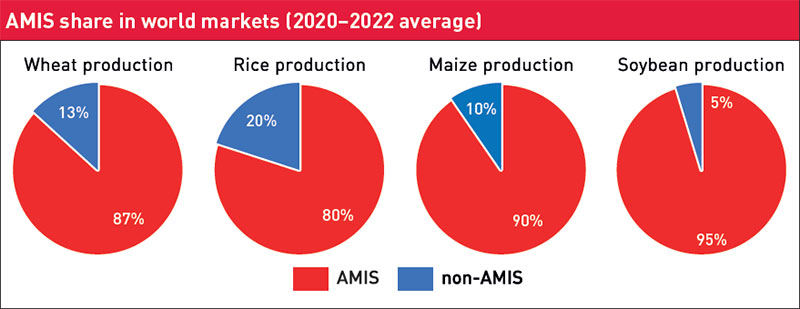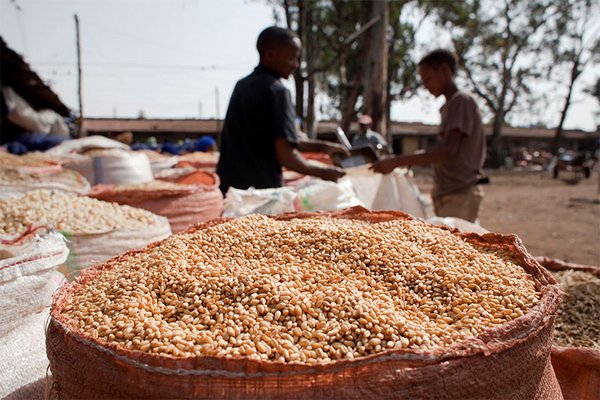 Download this article in magazine layout
Download this article in magazine layout
- Share this article
- Subscribe to our newsletter
AMIS – enhancing food market transparency and policy coordination
The Agricultural Market Information System (AMIS) came into being in response to the world food price crisis, the period in 2007-08 and 2010-11, which was characterised by surging and highly volatile global food prices. The crisis severely undermined the availability and affordability of food around the globe, resulting in political instability and social unrest in several countries. The drivers of the food price crisis were complex and continue to be the source of much debate. However, there is general consensus that better food market information and coordination could have mitigated some of the extreme market swings. This is especially the case as many of the policy decisions taken during this period, among them the abrupt implementation of export restrictions, are believed to have aggravated the situation and further stirred panic in markets.
To respond to these challenges, AMIS was mandated with two principle objectives: (1) enhance global food market transparency by providing relevant, timely and comparable food market data, especially on global production, stocks, trade, utilisation and prices of main food commodities (targeting wheat, maize, rice and soybeans), and (2) promoting policy dialogue among the principal trading countries of agricultural commodities, with a view to encouraging early discussion about critical market conditions and ways to address them. The initiative is composed of G20 members plus Spain (a permanent guest country of the G20) and seven invited countries that are major players in global food markets. Together, AMIS participants represent a large share of global production, consumption and trade volumes of the targeted crops, typically in the range of 80-90 per cent (see Figure), making discussions in AMIS both relevant and meaningful at global level. The initiative is hosted by the Food and Agriculture Organization of the United Nations (FAO) and supported by an inter-agency Secretariat currently comprising ten international organisations and entities.

AMIS is a collaborative effort between Secretariat member organisations and participating countries that have each committed to supporting its work through data and resources. In practical terms, this means that technical focal points from AMIS participants provide the Secretariat with regular updates of their countries’ supply and demand situation of the four target commodities (balances), which are further discussed in meetings of the so-called Global Food Market Information Group. Based on the information collected, senior-level representatives of AMIS participants engage in regular policy dialogue events to review the current food market situation and outlook in the framework of the AMIS Rapid Response Forum. Balances submitted to the Secretariat are analysed and cleaned, making the information comparable by applying a unified methodology, filtering out possible politically motivated biases and filling in data gaps resulting from missing capacity in the reporting country. To support national focal points in their data submission obligations, the Secretariat has engaged in various capacity building activities and stays in regular contact with participating countries to ensure their successful engagement in AMIS.
Are all these efforts paying off, especially given that 2021-22 saw another major surge in food prices despite the existence of AMIS? Several market observers, but most importantly the performance of markets during Covid-19 and, most recently, the war between the Russian Federation and Ukraine seem to suggest that the answer is “yes”. While the turbulences during the food price crisis were aggravated, and possibly even caused, by hasty and ill-informed policy decisions such as export restrictions, the number and duration of trade measures implemented during the last two crises have been relatively limited. In fact, global food trade has demonstrated an astonishing degree of resilience, despite the enormous challenges posed by a global pandemic and a war between two major food producers. Also, while the food price crisis was to a large extent “policy-induced”, the recent price spike can ultimately be explained by fundamental factors: strong demand following Covid-19, logistical bottlenecks in global supply chains, surging energy and fertiliser prices, and supply concerns due to the war in Ukraine. With the partial reopening of grain trade from Ukraine (e.g. Black Sea Grain Initiative and Solidarity Lanes) and a strong supply response expected by farmers this season, prices in international markets have already come down considerably. Finally, and irrespective of geopolitical tensions, the global response to these crises has been remarkably unified. Meetings of the Rapid Response Forum have been instrumental in agreeing on joint messages feeding directly into policy processes at both the G20 and, increasingly, the G7 level, fully endorsing the AMIS market assessments and the initiative’s call to leave food trade open.
Experiences from recent years show that AMIS obviously cannot prevent global food prices from surging. However, it can provide the tools to help limit the extent of future crises and contribute to safeguarding the normal functioning of global food markets.
Denis Drechsler is the Project Manager of the Agricultural Market Information System (AMIS). In this position, he oversees the implementation and development of AMIS activities and co-ordinates the work of the initiative’s inter-agency Secretariat. Prior to joining FAO, Denis was responsible for outreach and policy dialogue at the Development Centre of the Organisation for Economic Co-operation and Development (OECD).
Contact: AMIS-Secretariat(at)fao.org





Add a comment
Be the First to Comment